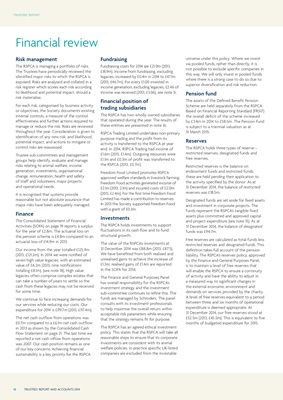
TRUSTEES' REPORT AND ACCOUNTS 2014
16
TRUSTEES' REPORT
Risk management
The RSPCA is managing a portfolio of risks.
The Trustees have periodically reviewed the
identified major risks to which the RSPCA is
exposed. Risks are analysed and collated in a
risk register which scores each risk according
to likelihood and potential impact, should a
risk materialise.
For each risk, categorised by business activity
or objectives, the Society documents existing
internal controls, a measure of the control
effectiveness and further actions required to
manage or reduce the risk. Risks are reviewed
throughout the year. Consideration is given to
identification of any new risk, and likelihood,
potential impact, and actions to mitigate or
control risks are reassessed.
Trustee sub-committees and management
groups help identify, evaluate and manage
risks relating to animal welfare, income
generation, investments, organisational
change, remuneration, health and safety
of staff and volunteers, major projects
and operational needs.
It is recognised that systems provide
reasonable but not absolute assurance that
major risks have been adequately managed.
Finance
The Consolidated Statement of Financial
Activities (SOFA) on page 19 reports a surplus
for the year of £2.8m. The actuarial loss on
the pension scheme is £4.8m compared to an
actuarial loss of £14.9m in 2013.
Our income from the year totalled £125.9m
(2013, £121.2m). In 2014 we were notified of
seven high value legacies, with an estimated
value of £6.2m (2013, nine notifications
totalling £8.1m), (see note 18). High value
legacies often comprise complex estates that
can take a number of years to settle so the
cash from these legacies may not be received
for some time.
We continue to face increasing demands for
our services while reducing our costs. Our
expenditure for 2014 is £119.7m (2013, £117.4m).
The net cash outflow from operations was
£0.7m compared to a £6.1m net cash outflow
in 2013 as shown by the Consolidated Cash
Flow Statement on page 21. The last time we
reported a net cash inflow from operations
was 2007. Our cash position remains as one
of our key concerns. Achieving financial
sustainability is a key priority for the RSPCA.
Fundraising
Fundraising costs for 2014 are £21.0m (2013,
£18.9m). Income from fundraising, excluding
legacies, increased by £0.4m in 2014 to £47.1m
(2013, £46.7m). For every £1.00 invested in
income generation, excluding legacies, £2.46 of
income was received (2013, £3.06), see note 3i.
Financial position of
trading subsidiaries
The RSPCA has two wholly owned subsidiaries
that operated during the year. The results of
these entities are presented in note 16.
RSPCA Trading Limited undertakes non-primary
purpose trading and the profit from its
activity is transferred to the RSPCA at year
end. In 2014, RSPCA Trading had income of
£1.6m (2013, £1.4m). Outgoing resources were
£1.1m and £0.3m of profit was transferred to
the RSPCA (2013, £0.7m).
Freedom Food Limited promotes RSPCA
approved welfare standards in livestock farming.
Freedom Food activities generated income of
£2.1m (2013, 2.1m) and incurred costs of £2.0m
(2013, £2.4m). For the first time Freedom Food
Limited has made a contribution to reserves.
In 2013 the Society supported Freedom Food
with a grant of £0.3m.
Investments
The RSPCA holds investments to support
fluctuations in its cash flow and to fund
structural growth.
The value of the RSPCA's investments at
31 December 2014 was £88.8m (2013, £87.5).
We have benefited from both realised and
unrealised gains to achieve the increase of
£1.3m; realised gains of £1.4m are reported
in the SOFA for 2014.
The Finance and General Purposes Panel
has overall responsibility for the RSPCA's
investment strategy and the investment
sub-committee continues to refine this. The
funds are managed by Schroders. The panel
consults with its investment professionals
to help maximise the overall return within
acceptable risk parameters while ensuring
that the strategy remains fit for purpose.
The RSPCA has an agreed ethical investment
policy. This states that the RSPCA will take all
reasonable steps to ensure that its corporate
investments are consistent with its animal
welfare policies. In practice specific UK-listed
companies are excluded from the investable
universe under this policy. Where we invest
via pooled funds, rather than directly, it is
not possible to exclude specific companies in
this way. We will only invest in pooled funds
where there is a strong case to do so due to
superior diversification and risk reduction.
Pension fund
The assets of the Defined Benefit Pension
Scheme are held separately from the RSPCA.
Based on Financial Reporting Standard (FRS17)
the overall deficit of the scheme increased
by £3.4m in 2014 to £58.5m. The Pension Fund
is subject to a triennial valuation as at
31 March 2015.
Reserves
The RSPCA holds three types of reserve -
restricted reserves, designated funds and
free reserves.
Restricted reserves is the balance on
endowment funds and restricted funds;
these are held pending their application to
the activity specified by the donor. As at
31 December 2014, the balance of restricted
reserves was £18.5m.
Designated funds are set aside for fixed assets
and investment in corporate projects. The
funds represent the RSPCA's tangible fixed
assets plus committed and approved capital
and project expenditure (see note 15). As at
31 December 2014, the balance of designated
funds was £94.7m.
Free reserves are calculated as total funds less
restricted reserves and designated funds. This
definition takes full account of the pension
liability. The RSPCA's reserves policy, approved
by the Finance and General Purposes Panel,
is to maintain a level of free reserves that
will enable the RSPCA to ensure a continuity
of activity and have the ability to adjust in
a measured way to significant changes in
the external economic environment and
demands on services provided by the charity.
A level of free reserves equivalent to a period
between three and six months of operational
expenditure is deemed appropriate. At
31 December 2014, our free reserves stood at
£52.5m (2013, £45.5m). This is equivalent to five
months of budgeted expenditure for 2015.
Financial review